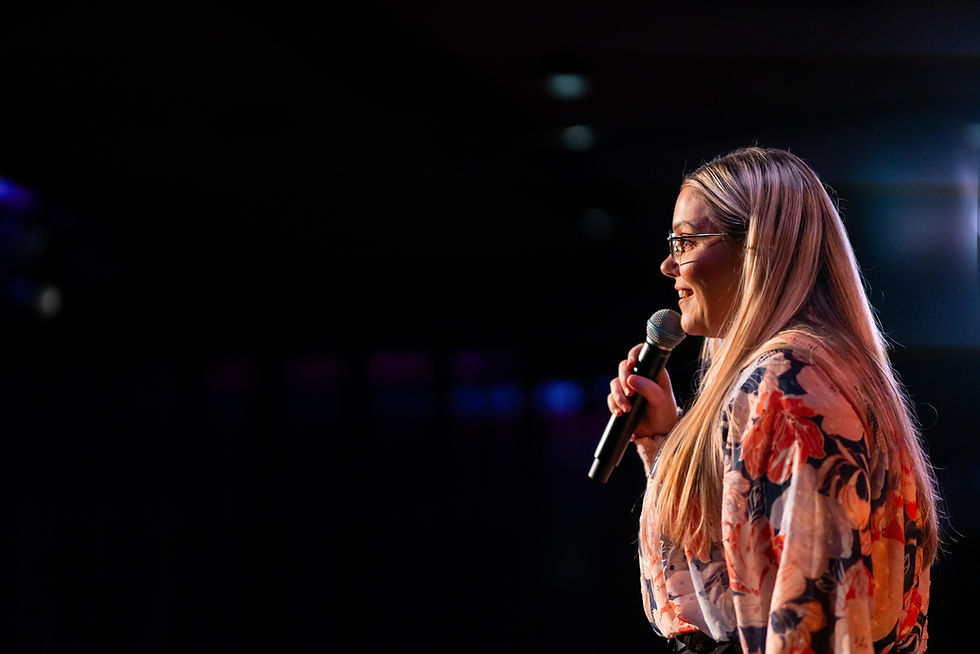5 Questions with Liz Courtney
- Sep 17, 2024
- 4 min read

Liz Courtney is an award-winning Sydney director and environmental activist, renowned for her films on climate change – most recently the documentary Antarctica: The Giant Awakens. After a successful 20-year career in media and PR agencies, Liz switched to filmmaking in 2010 and has made 55 documentaries, including the landmark TV series The Tipping Points. Since 2019, the TEDx speaker has been Artist in Residence at the Earth Observatory of Singapore, translating science into digital, television and social-media content.
Q1. What's been your best career move?
It was my big sliding-doors moment when I had the opportunity to step away from 20 years in corporate communications and go to Antarctica in 2010 to direct a film with 40 teenagers, Cool School Antarctica. That was the best career move I ever made – because I had no concept, really, of the perils of climate change. If I had not made that move, I wouldn't be where I am today. It made me face my fear. I had three kids under 12 and discussed it with them and my husband at the dinner table. I was thinking, “Who's going to do the lunch boxes? Who’s going to do the school runs?” The kids were saying, “Are you crazy, Mum? This is the best chance ever!” So, I had a big talk with myself: “Are you going to let fear rule your life?” I had to let the fear go. By then, I’d done a documentary for ABC and another for SBS, so I wasn't a total novice. But when you go to Antarctica, it's like you're filming on another planet. Twenty years ago, if somebody had said to me, “You're going to live in the Amazon rainforest, dogsled across the Arctic and go to Antarctica,” I would have laughed them out of the room. That’s how much my life turned upside down, but I have totally embraced it.
Q2. What do you wish you'd known when you started out in film?
Something I've learned over time which I didn't have at the beginning was understanding storytelling and story narrative. To begin with, I wasn't 100 percent on taking people on a journey, how you unbundle the story, where your highs and lows are, how you dive into different characters. That's come with experience and maturity. Also, with script writing, I came from a marketing/advertising side, and switching your storytelling across to that different narrative has taken me a number of years. If I were more skilled in that earlier, I would have been happier with my outcomes in the beginning. But last year I was back in Antarctica and looked at my planning and thought, “Girl, you actually have learned a lot!”
Q3. What’s the best advice you've been given?
Find some very good mentors. I didn't come through the normal pathways of film school or working my way up in a media organisation. I just jumped across from being a managing director of a comms agency. I really benefited from finding some fabulous mentors through going to film workshops and documentary conferences, particularly the annual World Congress of Science and Factual Producers. They were happy to talk to me, to give me advice, and to say, “Don't hesitate to call me if you need anything.” My professional hero and mentor is Steve Burns, a US filmmaker and one of the founders of Nat Geo and Discovery. He’s an absolute gem, one of those people who is so extraordinary, yet prepared to give you their time. I've learned so much from him.
Q4. What will the media look like in 10 years’ time?
I’m not sure, but I think flexibility and shorter content will be part of the landscape. We already consume media more in catch-up, so I think we’ll continue to take content when it works for us. I mostly watch things on my phone. Also, shorter content is something I've been playing around with. I did a series last year called Future Cities, and each episode is only 16 minutes. So, I think there'll be variations in time – short, punchy TV series or short series on social media. As filmmakers, we have to be really flexible – to work on different platforms and deliver content slightly differently.
Q5. How does the film industry stack up in terms of gender equality?
Being a female director in the documentary industry where you're going to far-flung places, most of my crew are usually male, not for any reason but just that we might need someone who's six-foot-two and can carry 20 kilos. Even if other people think they've got good ideas or their voice is louder than yours, you're the director and you're leading the team. Even if you’re not sure of what you’re doing, you still have to hold that ground because the whole project is on your back. You just have to trust yourself, because you got to that position for a reason. So just believe in yourself. When I pitched The Tipping Points to ABC and SBS, they both said no – they said it’s much too big a vision, you’ll never raise the money, blah blah blah. I got on a flight and went to Washington DC and thought, “Bugger that. I’m going to do it.” I knocked on all these doors, and within 48 hours NBC Universal had said yes – that was the first big chunk, just under a million dollars. That caused a domino effect. The European and Canadian broadcasters came in, and eight weeks later we were in Greenland – but if I’d taken all those no’s and sat on my sorry butt, I wouldn’t have done it. Sometimes when people say no, say thank you – because it should just make you more determined to do what you want to do. That’s my motto.
Interview by Susan Horsburgh



